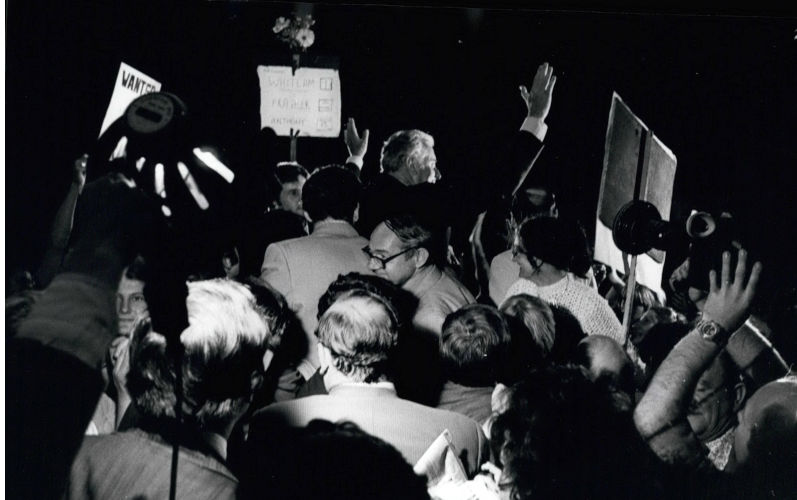Television had come to the fore in elections during the Whitlam campaign of 1972 when increased funds were spent on advertising with slogans (“It’s time” was backed by a catchy jingle) and mainly short television grabs for the news.
The 1975 election saw further radical changes in the way an election campaign could be run.
They included politicians’ avoidance of the press; their preference for carefully staged television and radio interview performances, an increased cost of campaigning run by public relations experts with heavy emphasis on advertising and the strategic distribution of information from opinion polls.
When journalists, who had been used to seeing a system work with agreed ethical rules established over time, saw their copy mishandled, ignored and treated differently. it upset them. And because the consequences were so great, Australian society so divided, the governor-general’s action so politically and legally disputed, the election stage-managed and their employers complicit in varying ways, many journalists were disillusioned and a few distraught. Others, a group referred to as the “Old Guard” took things a bit more in their stride.
They spoke frankly, but off the record, because for them to be identified in what was a small field was risky. Michelle Grattan declined to talk to me and later wrote a balanced review of my book.
Malcolm Fraser’s relationship with journalists from the beginning was hostile. A widely expressed view was that Fraser devised a stonewalling strategy, that is, he told the press nothing. He assiduously attacked Labor’s mismanagement of the economy, but spoke not a word about his economic policy and gave no evidence he could do better in those times.
“I tried to point out in copy that Malcolm was stonewalling the Press. I mean just not saying anything, you could not get an answer out of the guy. I had to ask him one question three times. Again, and again, and again… but he’d sit there like a wooden Indian and not say anything, and political correspondents would get angry. The rest of them would go off their brains with this guy sitting there and just saying nothing.”
The editor wasn’t interested in stories that said, “Hang on a minute, let’s analyse to what extent the Labor Government has caused the crisis in the economy and to what extent Malcolm Fraser has got a viable economic policy. We knew that Fraser was telling some deliberate untruths (about unemployment figures), and Gough’s problem was he was telling us the same thing: ’We were the government that brought you home from Vietnam’… Vietnam was about as relevant as Aeroplane Jelly.”
Les Carlyon, who became editor of The Age following the sudden death of the widely admired editor Graham Perkin on 16 October, less than a month before the Dismissal, said, “I had a terrific amount of external pressure during the election… a number of people cancelled ads. And that sort of pressure is a little bit hard because you don’t know where it will end… there was I think for a brief time anyway, some real threat that the whole system was going to fall down.”
An Age journalist summarised the state of play as he found it: “I was blanked out of the paper overnight, I know some of my colleagues’ stories never saw the light of day. I think there is no doubt they (the proprietors) certainly wanted Fraser to win and when the governor-general gave Fraser a head start, they saw no reason to reduce that head start… It’s who runs the presses who count, a correspondent can file his stuff, and they can publish it, they can put it where they like in the paper, they can doctor it, they can water it down and basically there is not much he can do about it… and that is how they manage the press. Simple.”
Brian Hogben at The Australian was sanguine about press influence on voters, “In the 1975 situation, if you compare the areas where we sold papers, with the areas of greatest swing, you will find, although we are accused of bringing down the Whitlam Government, that the greatest electoral swing was in electorates where we have little or no penetration by any of our papers. So, the press is important while it keeps on bringing out facts. When it gets to telling people how to vote, I think its effect is minimal.”
Max Walsh (AFR) disagreed. “The media has got a lot more power than it ever admits to having. It’s very convenient for us to say all we do is reflect opinion… what the press chooses to give coverage to can condition the community… And who runs Australia? Well, the truth of the matter is it runs itself, with quite a number of power bases. The media is a very important power base”.
Greg Taylor (The Age) agreed that the media defines the issues, sets the agenda and can choose an issue although not easily kill an issue. John Morgan at The Sun was direct. “The purpose of The Sun is to make profits for this company, reporting is its business. the point of a newspaper is to exist.”
The journalists overall did not believe that Whitlam would have won the election in 1975. Fraser with the Coalition (NCP) won 87 seats out of 127 electorates. Labor suffered a 30-seat loss. But they believed if the election had been run with open democratic principles, less damage would have been done. Fraser had become prime minister without the press extracting from him the elements of his policy and any commitments to the community. A precedent was set by the press abdicating its right to demand political information from a political leader, and public confidence was lost.
The public had a sense of what had occurred because four months after the election an Age poll showed Australians had a poor opinion of the presentation of political news and comment in the daily press. While more Labor than Liberal voters mistrusted the press, clearly the numbers went beyond partisan politics.
Those who vehemently supported Whitlam, who had thrived under his progressive social and cultural reform agenda, which transformed Australian life, active and vocal as they were during the campaign, proved to be a minority.
In November 1976, a year after the Dismissal, Paul Keating introduced an Amendment Bill to the Broadcasting and Television Act in reference to monopoly media control, stating, “The incestuous nature of the interlocking companies and directorships provides this small clique of proprietors with perhaps the most effective grip on the instruments of national media that could be witnessed in any part of the western world… What makes the situation frightening is that most of the proprietors who operate these groups share a common social background and in political terms a common point of view.”
The amendment was defeated and received very little discussion in the news media generally. And in 1976 the Fraser Government cut back the ABC’s funding by $5.7 million, making necessary the cancellation of some programs, including news and current affairs.
In the 1977 campaign, with Whitlam as Opposition Leader and Fraser as prime minister, Fraser won convincingly again. The Liberal Party won 67 seats to the Labor Party’s 38, with 19 seats going to the National Country Party. There was comparatively little interest in the campaign. The editor of The Age said, “Usually, the phones go mad, the letters pour in and the office is hell. But this time there was a deathly hush, an absolutely deathly hush. The calm made me think there’d be no change in government. It was very quiet.”
When Ranald Macdonald spoke to the National Press Club on 3 November 1977, he spoke of the apathy of the Australian citizen. “Society should and must demand results when newspapers, radio or television reveal clear cases of conflict of interest, corruption, malpractice, inefficiency and dishonesty. Instead, all too frequently, when investigative reporters disclose cases of clear public concern, a small initial interest is aroused and then nothing… There’s an element of ‘She’ll be right’ and ‘what’s the point?’ and perhaps distrust of the media. They just don’t think it’s worth taking part in a debate.”
Max Suich, in his Arthur Smith Memorial Lecture (1977), spoke of a lack of investigative journalism in Australia, saying there is “an absence of a climate of readers who encourage the press and a lack of competent inquiring journalists, and news executives with the necessary imagination to see the stories in front of their eyes. The nature of the industry today, tends to repel the creative, the talented and the unusual… All people care about is money frankly… they are terrified someone is going to take it off them and Labor poses the biggest threat”.
The picture that emerges from interviews with the press executives I spoke to is one of a capitalist institution under constant pressures of an economic and political nature which forces a conservative protectionist stance. The dilemma is, the press can only survive with the support of its readers, and the audience is not obviously concerned about the issues the serious press should be addressing in a democracy.
Sir Frank Kitto in 1977, as chairman of the Press Council, said, “A public revolt against newspapers is certain if their standards fail to satisfy the public judgment.”
The unfortunate, indeed, disastrous result, of the combination of press disregard for responsible debate and public distrust is that politicians have learnt the tricks of the trade and have successfully diluted the community’s political experience, particularly by their primary use of television and now social media. Truth is highly disputed.
All interviews with Press Gallery journalists, editors and management following the Dismissal are archived in the State Library of Victoria in the Patricia Edgar Collection.
The views expressed in this article may or may not reflect those of Pearls and Irritations.
Patricia Edgar is a sociologist, media researcher, film producer and writer, best known as the Founding Director of the Australian Children’s Television Foundation. She won numerous national and international awards for her innovative programs . She is the author of 15 books and an Ambassador for NARI the National Institute for Ageing.

